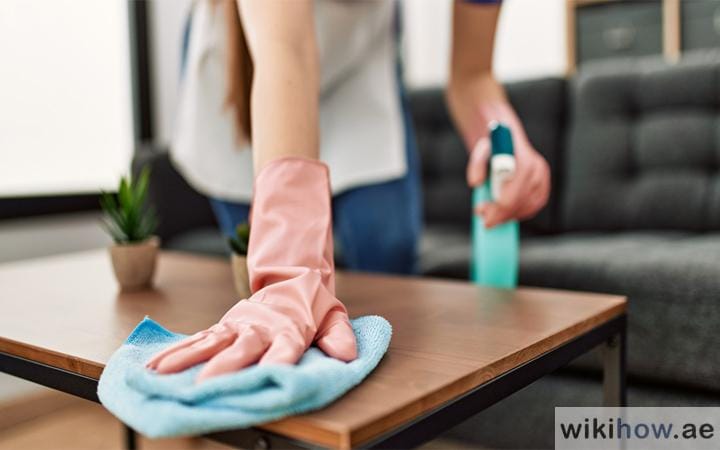UAE Labour Law for Domestic Workers (2026 Guide) | Rights, Salary and Leave Explained

The UAE Domestic Workers Law is a cornerstone within the country’s labor system, protecting employers and domestic workers under an established legal umbrella. Enacted to make domestic labor lawful, the law regulates working conditions, contracts, wages and dispute settlement.
Passed under Federal Law No. 10 of 2017 and subsequently amended by Cabinet Resolution No. 106 of 2022, this law covers a large number of workers in domestic roles from maids and cooks to gardeners, nannies, drivers and private nurses. Its aim is to find a balance between fair treatment and national standards of work and social justice.
Quick review of the article’s key points:
- Federal Decree-Law No. 9 of 2022 now governs working hours, wages, contracts and dispute resolution for all domestic workers in the UAE.
- The law applies to a wide range of roles, including nannies, cooks, gardeners, drivers, cleaners and private nurses.
- New 2026 revisions introduce mandatory digital contracts to improve transparency and prevent contract manipulation.
- Employers are now legally required to pay wages on time, with financial penalties for delays or unauthorized deductions.
- Domestic workers are entitled to 30 days of paid annual leave, paid sick leave and at least one fully paid weekly rest day.
- It is strictly illegal for employers to confiscate passports or IDs, and violations can lead to heavy fines and legal action.
- Licensed recruitment agencies must follow ethical hiring standards, with unlicensed hiring now subject to severe penalties.
- End-of-service gratuity for domestic workers is calculated at 14 days’ wage for each year of service under the updated law.
Overview of the New Domestic Workers Law in UAE
The UAE’s recently passed Domestic Workers Law is a big step in defending the welfare and rights of domestic workers. By clearly defining their responsibilities, rights and working conditions, it seeks to establish an equitable and open relationship between employers and domestic workers. The law enforces moral hiring practices, guarantees timely wage payments, and fortifies labor protections. Additionally, it supports the UAE’s adherence to global labor standards, creating a more equitable and civil workplace for all.

An explanation of Federal Decree-Law No. 9 of 2022
The legal framework for domestic workers in the United Arab Emirates is based on Federal Decree-Law No. 9 of 2022. This law, which addresses issues like working hours, yearly leave, health insurance and termination procedures, lays out the main responsibilities of employers and the rights of domestic workers. It forbids discrimination and forced labor in all its forms and places a strong emphasis on openness in employment contracts. The law guarantees that domestic workers in the United Arab Emirates are treated with the same respect and equity as other types of workers by establishing unambiguous legal requirements.
Who is protected by the domestic workers law in the UAE?
Nannies, cooks, gardeners, drivers, cleaners, and private tutors are among the many household service providers covered by the UAE domestic workers law. In essence, this group includes anyone hired to carry out household or domestic duties. Regardless of nationality, the law guarantees that all workers receive fair compensation, safe working conditions, and rest periods. It also describes what sponsors and recruitment firms must do to avoid unfair treatment or exploitation.
Important revisions and changes made in 2026
The UAE Domestic Workers Law will undergo several progressive updates in 2026 to improve worker welfare and simplify employer responsibilities. Stricter rules for employment agencies, digital contracts that are required for transparency, and new grievance procedures to effectively settle conflicts are some of the major adjustments. In addition, the revised law includes penalties for late wage payments, restrictions on working hours and enhanced medical coverage. The UAE government’s continuous efforts to update labor laws and encourage moral hiring practices in accordance with international norms are reflected in these reforms.
Legal Rights of Domestic Workers in the UAE
Domestic workers in the UAE are entitled to basic legal protections like reasonable compensation, weekly holidays, annual paid leave and written contracts. These protections promote dignity, security and treatment with respect as per national labor standards.

Right to Employment Contracts
All domestic workers are entitled to written labour contracts, signed and stamped by the Ministry of Human Resources and Emiratisation (MoHRE). The contracts must clearly mention job titles, wages, leave entitlements, and working hours. It is essential to be aware of your rights under a valid Labour Contract in UAE as it is the statutory basis of employment relations and protects both parties in the event of a dispute.
Wages and Timely Payment
The employers must pay the domestic workers on time every month without making any unauthorized deductions. The UAE insists on payment in UAE dirhams, either directly or through authorized bank transfers for the sake of transparency.
Weekly rest day and maximum working hours
To protect domestic workers’ health and welfare, the law clearly limits their working hours. In general, domestic workers should be allowed to take sufficient breaks during working hours and not be obliged to work more than 12 hours per day. Every employee also has the right to at least one day of fully paid rest each week. Employers are urged to honor this day off and create a welcoming, secure workplace where employees can relax and rejuvenate. These clauses help avoid burnout and encourage a healthy work-life balance.
The entitlement to paid sick leave and annual leave
In order to allow them to rest and recuperate when necessary without losing their income, domestic workers in the United Arab Emirates are entitled to both annual paid leave and sick leave. After a year of service, employees usually get 30 days of paid annual leave. Upon presenting a medical certificate, they are eligible for paid sick leave in the event of illness. These benefits support long-term job satisfaction and well-being by bringing domestic workers’ rights into line with more general labor protections throughout the United Arab Emirates.

Rights to compensation and end-of-service gratuities
Domestic workers who have worked for at least a year are eligible for an end-of-service gratuity upon completion of their employment. This benefit, which normally equates to 14 days of pay for every year of service, is determined by the worker’s final salary. Workers may also be compensated for unjust termination, unused leave or contract violations in addition to gratuities. The UAE’s dedication to guaranteeing equitable treatment and compensating domestic workers for their significant contributions to households and society is reflected in these financial rights.
Employer Obligations Under UAE Domestic Labor Law
Domestic workers must be accorded respect and dignity by employers without any proof of abuse, harassment or exploitation through forced labor. They must be provided with proper health insurance, fully paid by employers, including basic medical needs as well as emergency care. The employers are also bound by law to provide decent accommodation, wholesome food and appropriate clothing suitable for the work all of which shall not be deducted from the workers’ wages. Regarding overtime work, the employers must strictly follow the UAE overtime payment laws and they must pay just compensation for extra hours above the agreed working time.

establishing a polite and safe workplace
Legally, employers must give domestic workers a respectful, safe and healthy workplace. This includes shielding employees from abuse, harassment and physical harm. At all times, adequate living conditions must be maintained, including suitable housing, hygienic amenities, and access to food and rest. Another important requirement under UAE law is to respect the privacy and dignity of domestic workers. These actions are in line with the UAE’s overarching goal of upholding moral principles and advancing human rights in every home and workplace.
Paying for hiring and healthcare
Employers are entirely liable for paying all hiring and deployment costs associated with employing domestic workers under UAE labor laws. This covers travel expenses, agency fees, visa processing, and medical exams. Additionally, employers must offer health insurance or pay for medical bills for the duration of an employee’s employment. These regulations guarantee that domestic workers receive prompt medical attention when necessary and are not subjected to financial obligations associated with their jobs. Employers show equity and responsibility in the hiring process by bearing these expenses.
Prohibition of denying IDs or passports
Under UAE law, it is strictly forbidden to withhold a domestic worker’s passport, identification card, or other personal documents. Such acts can have major legal repercussions for the employer and are regarded as a violation of the employee’s personal freedom. Employees must always be able to access and keep their identification documents. This rule supports openness, mutual respect and trust in domestic employment relationships while reaffirming the UAE’s zero-tolerance policy toward forced labor.
Wages, Working Time and Overtime Compensation
UAE domestic workers have the right to full and on-time payment of wages as contracted, with no unauthorized deductions. The workday of domestic workers must not be more than 12 hours and be compensated with additional pay or time off for overtime.
- Minimum Wage Obligations: Although there isn’t a national minimum wage, salaries for domestic workers should be fair and mutually agreed. Minimum pay advice is sometimes provided by certain embassies by nationality.
- Legal Working Time: The legal working day is no longer than 12 hours, including resting time. Any extra hours need to be compensated justly.
- Overtime Compensation: The payment of overtime can either be in the form of extra wages or time off in lieu, depending on the agreed understanding in the contract.
Rights to Leave and Time Off
Domestic workers in the UAE receive 30 days of paid annual leave, plus one paid weekly rest day after one year of service. They are also entitled to sick leave and compassionate leave under certain conditions.

Rules for accumulation and annual leave entitlements
After one year of continuous service, domestic workers are entitled to 30 days of fully paid annual leave under the 2026 amendments. With permission from their employer, employees may take their leave in full or in smaller chunks. The employee is still eligible for proportional leave based on their number of months of service even if they haven’t yet reached the end of the year. Furthermore, in the event that the contract expires, unused annual leave may be converted into cash compensation or carried over to the following year. This flexibility guarantees that domestic workers can balance their personal and professional needs fairly while taking a break without suffering financial losses.
Conditions and length of paid sick leave
Workers are eligible for up to 30 days of sick leave per year, of which the first 15 days are fully paid salary and the remaining 15 days are half salary. Find out more about Sick leave laws in UAE. On the basis of mutual agreement, more unpaid leave may be given if the illness persists after this time. Employers are not allowed to end a worker’s contract while they are on sick leave unless the worker is found to have misused their entitlement. These clauses strengthen the UAE’s dedication to humane labor standards and health protection by ensuring that domestic workers have time to recuperate fully without worrying about losing their jobs or income.
Compassionate, emergency and maternity leave
The UAE’s emphasis on family welfare is reflected in the 2026 law, which offers domestic workers improved maternity and compassionate leave benefits. The 60-day maternity leave entitlement for female domestic workers consists of 15 days of half-pay and 45 days of full pay. Additionally, with the employer’s consent, employees may request compassionate or emergency leave in situations like the death of a close relative or other pressing family issues. These rights encourage compassion and understanding in domestic worker-household employment relationships while acknowledging the personal responsibilities of domestic workers.
Public holidays and compensation for rest days
In the United Arab Emirates, domestic workers are entitled to all government-proclaimed official public holidays. They must be given an alternate day off or extra pay equivalent to one day’s salary if they are forced to work on a public holiday or their weekly rest day. Fairness and respect for the worker’s right to rest are thus guaranteed. Employers are urged to arrange domestic tasks in a way that respects these rights, fostering a courteous and upbeat workplace that is consistent with the UAE’s changing labor laws.

Regulations for Employment Agencies and Recruitment
In order to guarantee moral, open, and equitable hiring practices, the UAE’s updated 2026 Domestic Workers Law places a high priority on regulating employment and recruitment firms. These rules seek to end exploitation, improve supervision of hiring agencies and ensure that domestic workers are employed in a humane and legal manner. The law encourages accountability at every step of the hiring process, from hiring in the worker’s home country to their employment in the United Arab Emirates, by imposing stringent licensing requirements and explicit employer obligations.
License requirements and authorized employment agencies
In the United Arab Emirates, only government-approved and licensed recruitment firms are allowed to hire and place domestic workers. The Ministry of Human Resources and Emiratization (MOHRE) is responsible for overseeing these agencies’ operations, and they are subject to stringent regulations. Agencies must show transparency in contracts, clearly explain employment terms to employees and make sure candidates are not charged any additional fees in order to keep their license. Additionally, agencies must cooperate with inspections and submit compliance reports on a regular basis. Workers are shielded from unlicensed agents and dishonest hiring practices by this licensing framework.

Employer responsibilities under employment agreements
Under recruitment contracts, employers who use approved agencies to hire domestic workers are subject to certain legal obligations. They have to cover all associated hiring and placement costs, make sure that workers understand their employment contracts, and offer decent living and working conditions when they first arrive. Employers must also adhere to all conditions specified in the contract, including those pertaining to pay, leave, and vacation time. The employer may be held accountable if an employee quits their job because of abuse or a breach of contract. These clauses ensure openness and support moral hiring procedures from the outset of employment.
Prohibited hiring procedures and safeguarding employees
To protect domestic workers from exploitation, the 2026 law expressly forbids a number of unethical hiring practices. Employers and agencies are not allowed to charge workers recruitment fees, seize personal documents, misrepresent job terms or transfer employees to other employers without permission. Agencies must also make sure that, prior to their arrival in the UAE, all hired workers are fully informed about their rights, working conditions, and pay. Heavy fines, license suspensions or permanent operating bans may follow violations of these regulations. The UAE’s dedication to moral hiring practices and the international norms of just labor migration are reaffirmed by these safeguards.
Penalties for employers violating domestic worker rights
The amended law now imposes harsher financial and administrative penalties on employers who violate the rights of domestic workers. Depending on the seriousness of the offense, fines for non-payment of wages, forced labor, verbal or physical abuse, and contract violations can range from AED 5,000 to AED 50,000 per infraction. In extreme circumstances, the Ministry of Human Resources and Emiratization (MOHRE) may blacklist employers, suspend them from employing domestic workers, or prosecute them criminally. The law ensures justice and serves as a deterrent against future misconduct by emphasizing zero tolerance for mistreatment and requiring restitution to impacted workers.
Repercussions for unlawful employment or breach of contract
Hiring or transferring domestic workers illegally outside of authorized channels is strictly prohibited by law. Employers or organizations that are caught doing such things, like hiring someone without a permit, making false contracts, or illegally transferring sponsorships, risk heavy fines, jail time or having their recruitment licenses revoked. In a similar vein, employees who work illegally or flee without a reason may be subject to administrative sanctions, such as future employment prohibitions. By guaranteeing that all employment relationships are lawful, open and advantageous to both parties, these steps seek to maintain the integrity of the UAE labor system.

MOHRE support channels and the worker complaint procedure
The UAE provides domestic workers with a simple and safe way to report infractions or conflicts through MOHRE. Employees can use their preferred language to file complaints through the MOHRE smart app, official service centers, or the MOHRE helpline (800-60). Every case is examined by the ministry, which also mediates disputes between parties and, if necessary, refers unresolved issues to labor courts. Additionally, MOHRE offers workers who are being abused legal aid, temporary housing and confidential support. This simplified procedure guarantees prompt resolution, safeguards employees’ rights and encourages equity in domestic work.
Common Misconceptions About Domestic Workers Law
There are several common myths surrounding the Domestic Workers Law in the UAE that have a tendency to confuse employers and workers. One such myth is that domestic workers cannot change employers; the fact, however, is that they can legally do so by completing their contract or on special legal bases, i.e., breach of contract or abuse. Among the misconceptions is that verbal agreements between employers and employees are sufficient, whereas only written contracts registered and approved by the Ministry of Human Resources and Emiratisation are recognized and enforceable under UAE law.
Conclusion
The UAE Domestic Workers Law is a progressive protective law that encourages equity, dignity, and safety for domestic workers across the Emirates. With clear contracts, regular inspections and strong penalties for abuse, the UAE is setting a regional benchmark for domestic labor reform.
Desire to Stay Current with the New UAE Labor Laws; Check out WikiHow UAE for current news, legal updates and expert solutions to all your domestic worker and employment rights questions. Discover Now and Stay Up-to-Date with Confidence!
FAQs
1. Are domestic workers entitled to end-of-service benefits?
Yes, based on 14 days’ wages per year of service.
2. Can a domestic worker work for more than one family?
No, they are tied to one employer under a formal contract.
3. Do domestic workers get public holidays off?
Yes, public holidays are either given as leave or compensated.
4. What is the minimum age for hiring a domestic worker in UAE?
The minimum legal age to hire a domestic worker in the UAE is 18 years old. Hiring anyone below this age is strictly prohibited and considered a violation of labor laws.
5. Are domestic workers entitled to gratuity under UAE law?
Yes, Domestic workers in the UAE are entitled to end-of-service gratuity after completing at least one year of continuous service. It is calculated as 14 days of basic wage for each year of employment, paid upon contract termination.
6. Can domestic workers change employers legally?
Yes, Domestic workers can legally change employers if their contract ends, or if they have a valid reason such as non-payment of wages or mistreatment. The transfer must be approved by MOHRE to ensure compliance with UAE labor regulations.






some employer doesn’t follow the uae law..like housemaid they start their work as early as 5am and end at 12midnight sometimes 1-2am.no day off no rest no food and clothing allowance. after completing the 2yrs contract you will leave with zero benifts no gratuity no paid day off no annual leave pay and sick leave pay..you cannot get all those written in uae law esp.when your employer is local..im not saying that all local is bad but on my 15 yrs working here in uae ive seen a lot…they treat the housemaid is garbage.. haram wallah!
Sadly, some employers do ignore the law, but such treatment is unfair and inhumane. Hopefully, with more awareness and enforcement, all workers will get the rights they truly deserve.
Hi mates, its great paragraph concerning tutoringand entirely explained, keep it up all the time.
Thanks a lot! Glad you found it helpful appreciate the support!
I am continuously browsing online for articles that can help me.
Thank you!
You’re very welcome! We’re glad our articles could help, and we’ll keep sharing more useful content for you.